高二外研英语周报2016
英语周报2016-2017学年高二外研版选修七:Module 4 辅
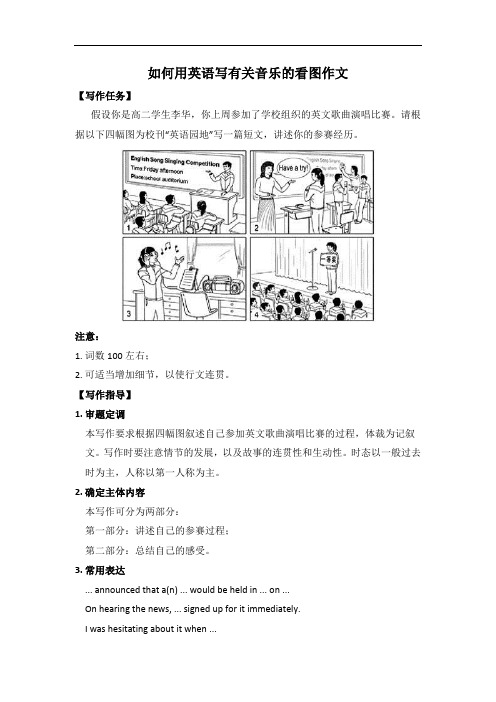
如何用英语写有关音乐的看图作文【写作任务】假设你是高二学生李华,你上周参加了学校组织的英文歌曲演唱比赛。
请根据以下四幅图为校刊“英语园地”写一篇短文,讲述你的参赛经历。
注意:1. 词数100左右;2. 可适当增加细节,以使行文连贯。
【写作指导】1. 审题定调本写作要求根据四幅图叙述自己参加英文歌曲演唱比赛的过程,体裁为记叙文。
写作时要注意情节的发展,以及故事的连贯性和生动性。
时态以一般过去时为主,人称以第一人称为主。
2. 确定主体内容本写作可分为两部分:第一部分:讲述自己的参赛过程;第二部分:总结自己的感受。
3. 常用表达... announced that a(n) ... would be held in ... on ...On hearing the news, ... signed up for it immediately.I was hesitating about it when ...I practised ... again and again ...Then came the big day.I did a really good job and won the first prize, which made me excited.This certainly would be a memorable experience for me!【参考范文】Last Monday, our monitor announced that an English Song Singing Competition would be held in the school auditorium on Friday afternoon. On hearing the news, some classmates signed up for it immediately. I was hesitating about it when my English teacher told me it was a good chance to show my talent. So I decided to have a try.During the following days, I practised the song I had picked again and again until I thought I was well prepared. Then came the big day. I did a really good job and won the first prize, which made me excited.This certainly would be a memorable experience for me!。
英语周报2016-2017学年高二外研版选修八:Module 4 教
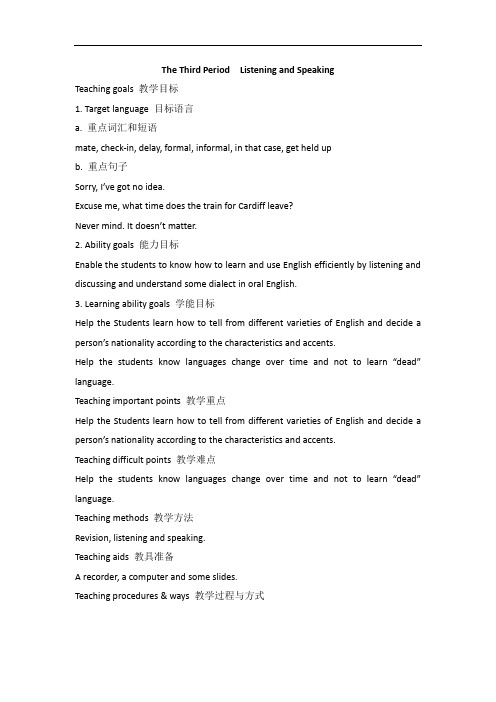
The Third Period Listening and SpeakingTeaching goals 教学目标1. Target language 目标语言a. 重点词汇和短语mate, check-in, delay, formal, informal, in that case, get held upb. 重点句子Sorry, I’ve got no idea.Excuse me, what time does the train for Cardiff leave?Never mind. It doesn’t matter.2. Ability goals 能力目标Enable the students to know how to learn and use English efficiently by listening and discussing and understand some dialect in oral English.3. Learning ability goals 学能目标Help the Students learn how to tell from different varieties of English and decide a person’s nationality according to the characteristics and accents.Help the students know languages change over time and not to learn “dead” language.Teaching important points 教学重点Help the Students learn how to tell from different varieties of English and decide a person’s nationality according to the characteristics and accents.Teaching difficult points 教学难点Help the students know languages change over time and not to learn “dead” language.Teaching methods 教学方法Revision, listening and speaking.Teaching aids 教具准备A recorder, a computer and some slides.Teaching procedures & ways 教学过程与方式Step ⅠRevision and checkingT: Last period I asked you to find some differences between varieties of English. Have you finished?Ss: Yes.T: What are the differences?S: I want to say some differences between British English and American English. Written English is more or less the same in both Britain and America. But in the spoken language the differences are greater. Such as the words: flat and apartment, lift and elevator; rubber and eraser. In pronunciation, Americans say fast /fæst/, while in England they say /fɑ:st/. There are some other differences in using words. For example, in America, they say “fall, store, right away”, while people from Britain say “autum n, shop, at once”. However, people from the two countries can understand each other.T: Wonderful! Today, we will still talk about the differences varieties of English. First, let’s come to listening. Please turn to Page 48.Step Ⅱlistening1) First listeningLet the students look through the directions of Activity 1 to make sure what they need to do.T: Here are several conversations. Listen to them carefully when I play the tape for the first time. Try your best to get the general idea of each conversation.Let the students listen to them for the general ideas.2) Listening (the second time)T: Have you got the general ideas?Ss: Yes / No.T: I will play the tape a second time. This time listen and decide where the conversations take place, and tell which variety of English is spoken. Use some words to help you or just tick “√”in the table.Teacher plays the tape again and let the students finish Activity 1.3) Listening (the third time)Play the conversations one by one. Before playing each conversation, ask the students to read the questions first.T: Now, read the questions of the first conversation, then I will play the tape. Please make a note to help you remember some important information. Are you ready? Ss: Yes.T: OK. Let’s begin.Teacher plays the conversations one by one. Write the answers on the screen. (答案略)T: So much for listening. Look at the screen and check your answers. Discuss your answers with your partners.4) Listening and speaking in Workbook on Page 113T: Please turn to Page 113. Read the questions quickly and then listen to the tape to find out the answers. Write down the important information as quickly as you can when listening.Give the students some time to read the questions and play the tape.Step ⅢSpeaking1) DiscussionT: We have read and listened to a lot about differences between Englishes so far. What we are going to do is to talk about some questions related to English. Please read the questions in the speaking section on Page 50.T: I think the first question is very easy. Do you think so?Ss: Yes. We heard different accents in listening part just now.T: What are the differences in accent?S: The differences are in many aspects, such as in pronunciation, intonation, tune or the last word of each sentence. Sometimes they choose different words to express the same meaning.T: Can you say something in detail?S: Yes, of course. In American English, the letter ‘a’in dance, class, fast and half is pronounced /æ/, but in British English it is pronounced /ɑ:/. Not, hot are pronounced /nɑ:t/ and /hɑ:t/, but in British English, they are /nɒt/ and /hɒt/. Clerk in American English is /klɜ:rk/, but /klɑ:k/ in British English. In using words in America, they say “fall, store, right away”, while people from Britain say “autumn, shop, at once”.T: Terrific! Please sit down. As for the last two questions, I think it is hard to say yes or no. Maybe you have different opinions on these questions. So you have 7 minutes to have a discussion.Seven minutes later, teacher can ask some groups to present their opinions to the whole class.Group 1Sa: We are going to say something about the third question. As we all know, there are varieties of English in the world. I think there are some varieties easier to understand than some others. The languages of many countries have influenced the English language. Some are becoming easier, but some are becoming more difficult, for example, Australian English, whose individual sounds and intonation patterns sometimes make it difficult for British and American people to understand. So I think it is a difficult variety of English in the world.Sb: I am sorry, but I don’t think you are right. I think it is impossible to say which English is easier than the other. Each language has its own characteristics. It is easier for its native speakers to understand each other.Sc: I agree with Sb. I think British and American English also have dialects and slangs.Sometimes they are difficult to understand. Australians may have trouble in understanding them. So it is hard to say which is easy and which is difficult. Sd: I think you all are reasonable. Yes, we can’t tell which variety of English is better or easier. It may be difficult for some people, but easy for some others. Just like Chinese, some foreigners say it is easy, while others say it is the most difficult language in the world. What we need to do is to make communication easier. Group 2Se: We talked about question 4. I think there is a right and a wrong way to speak English.Sf: Really? I think I can’t agree with you. It is impossible to say whether one variety of English is right or not.Se: I know that a lot of expressions exist in the world, which are not correct, but people use them. And they make communication more convenient and easier.Using and correctness are two different things.Sg: I agree with Sf. Because there is no real standard form that everyone can agree on.How can you say which is correct and which is incorrect? The most important thing is communication. Correctness doesn’t matter.Sh: Sg, you are absolutely wrong. Though people use some incorrect forms to communicate, it does not mean we can pay no attention to the wrong grammatical features, or we don’t use link verbs or article, just like some language on the Internet. If we allow this to go on, we will make English more confusing. So I think we need to know some differences.2) Speaking on Page 113T: Excellent job! Now, you have two more questions to discuss. They are on Page 113 in Activity 10.Give the students a few minutes for discussion. The teacher can ask some students to present their opinions.T: Do you think students should study “dead” languages? Why or why not?S: I don’t think students should study “dead”languages. “Dead”languages are useless. Languages are part of cultures. People study languages to communicate with each other. Languages are changing with society, with the development of science and technology. In a word, they change as time goes by. The languages of English and Chinese are two good examples. English has changed a lot during the past centuries. No one speaks the old English that Shakespeare used. No one will understand you if you speak the old Chinese with “之,呼,者,也”.T: Terrific! Which languages do you think are most important for Chinese students to learn?S: I think English, French, Japanese and German are most important languages for Chinese students to learn. We learn languages to communicate and to help make our country stronger. So if we master the languages of the developed countries, it is convenient for us to learn and bring in their advanced things to equip us.T: Great reason. Next, let’s make up dialogues using different English words.3) Making dialoguesGive students some words. Let the students make up a dialogue.The situation is: A person from Hawaii is visiting China. He wants to go to a cinema, but doesn’t know the way. He asks a Chinese student the way.Give the students some time to prepare the dialogues. Then ask one or two pairs to act it out in class.Sample dialogue:S1: Aloha.S2: Pardon? What is Aloha?S1: That is Hello!S2: Hello! What can I do for you?S1: Would you tell me the way to the cinema? I’d like to see a movie.S2: Movie?S1: Yes.That’s a film.S2: Go straight ahead and cross three streets.The cinema is on your left-hand side.S1: Could you say that again, please?S2: Go straight ahead and then go over three blocks.The cinema will be on your left.By the way, where are you from?S1: I’m from Hawaii.I am visiting your country.I like your country very much.S2: I’m glad to hear that.Please follow me.I can take you to the cinema.My flat is on that street.S1: Sorry, I can’t follow you.What is flat?S2: Flat means apartment.I moved here last autumn.S1: Do you mean “last fall”?S2: Quite right.Well, your English is quite different from what my teacher teaches us.S1: Actually, I speak American English.You understand British and American English.That’s great!T: Good job! I am very pleased that all of you are active in the activity. I believe your oral English will be better and better. We need to know the differences, but we needn’t imitate them. Our last task is EVERYDAY ENGLISH. Read them and guess their meanings.Step ⅣEveryday EnglishGive the students two or three minutes to read EVERYDAY ENGLISH and choose the answers. Then check the answers.Step ⅤSummary and homeworkT: It’s time to end this class. In this lesson, we have learned how to tell varieties of English according to the accents and talked about some differences between Englishes. Homework for today:1. Pick out the sentences with adverbials and adverbial clauses.2. Preview the grammar: Adverbial and Adverbial clause.。
英语周报2016-2017学年高二外研版选修八:Module 2 教案 附件 精品

附件Ⅰ.课文注释与疑难解析1.For many people, the Renaissance means 14th to 16th century Italy, and the developments in art and architecture, music and literature which took place there at that time. (P16)对很多人来说,文艺复兴是指14到16世纪的意大利,以及当时艺术、建筑、音乐、文化等各方面的发展。
1) 句中的take place 是“发生”的意思,具有相同用法的还有happen, breakout。
e.g: Great changes have taken place in China in the past 50 years.在过去的五十年中,中国发生了翻天覆地的变化。
2) take place 表示的是事情有计划地、自然地发生。
happen表示的是偶然的发生。
break out指疾病、战争等灾难性事件的爆发。
e.g. An accident happened in the street yesterday.昨天街上发生了一起事故。
In 2003, SARS broke out in China without any sign.2003年,非典毫无预兆地在中国爆发了。
3)这三个词都不用于被动语态。
e.g. World WarⅠwas broken out in 1914. (false)World WarⅠbroke out in 1914. (right)2. It is believed to be the best example of a new life-like style of painting that amazed people when it was first used. (P16)这幅惊世之作刚刚问世,就被人们看作是新颖逼真的绘画作品之最佳典范。
英语周报2016-2017学年高二外研版选修八:Module 6 课件 Grammar 精品
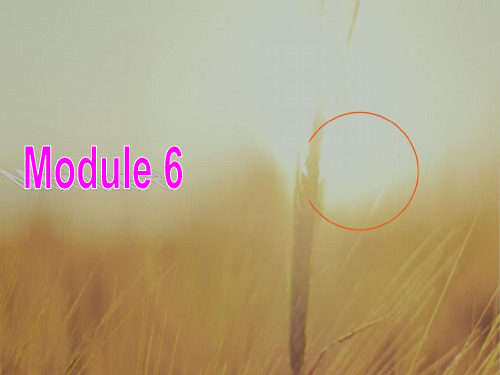
【注意】 may 暗含的可能性_较__小___,must 暗含 的可能性__较__大___。
5) must的简短回答: e.g. Must I clean the dining room at once? 我必须马上打扫餐厅吗? –Yes, you must. – No, you needn’t. – No, you don’t have to.
2) I think all poems should have rhymes. (e) This sentence expresses an opinion about what is right.
3) You should have asked my dad.
(a) This sentence refers to something which didn’t happen.
3) He was probably a very lonely man. He must have been a very lonely man.
4) One possibility is that he died from alcohol poisoning. He may/might have died from alcohol poisoning.
4) The two men must have been very good friends. (a) They might have been good friends. (b) They were probably very good friends. (c) It is certainly true that they were good friends.
英语周报2016-2017学年高二外研版选修八:Module 4 课件 Writing 精品
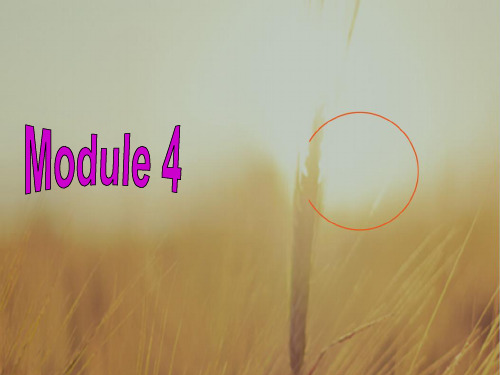
【参考范文】 Recently more and more network
buzzwords like “no zuo no die”, which are called Chinglish, have entered the Urban Dictionary. Different people have different opinions about it.
For
Against
3. Match the expressions with their meanings. 1. Firstly, … 2. Next, … 3. On the other hand… 4. In conclusion, … 5. Furthermore, … 6. Finally / Lastly …
Those who are for this think these network buzzwords enrich English. On the one hand, they are vivid and easy to understand and thus they are easier to learn.
【常用表达】 Recently more and more network buzzwords like ... have entered the Urban Dictionary. Different people have different opinions about ... Those who are for this think ... On the one hand, ... On the other hand, ... However, those who are against it think ... As far as I’m concerned, ...
英语周报2016-2017学年高二外研版选修七:Module 6 试
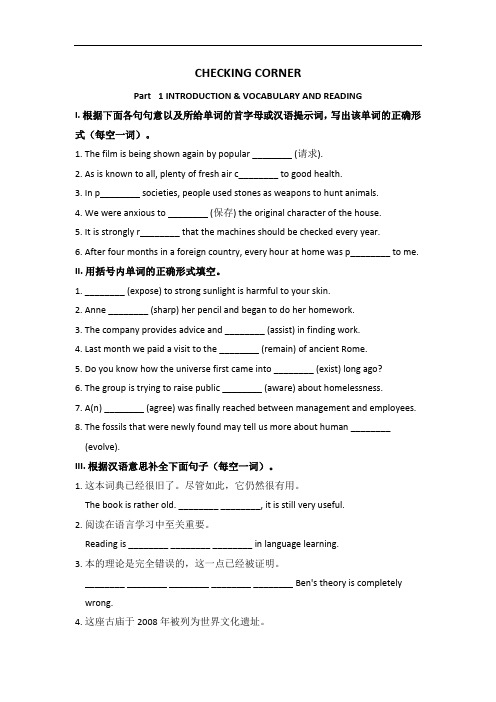
CHECKING CORNERPart 1 INTRODUCTION & VOCABULARY AND READINGI. 根据下面各句句意以及所给单词的首字母或汉语提示词,写出该单词的正确形式(每空一词)。
1. The film is being shown again by popular ________ (请求).2. As is known to all, plenty of fresh air c________ to good health.3. In p________ societies, people used stones as weapons to hunt animals.4. We were anxious to ________ (保存) the original character of the house.5. It is strongly r________ that the machines should be checked every year.6. After four months in a foreign country, every hour at home was p________ to me. II. 用括号内单词的正确形式填空。
1. ________ (expose) to strong sunlight is harmful to your skin.2. Anne ________ (sharp) her pencil and began to do her homework.3. The company provides advice and ________ (assist) in finding work.4. Last month we paid a visit to the ________ (remain) of ancient Rome.5. Do you know how the universe first came into ________ (exist) long ago?6. The group is trying to raise public ________ (aware) about homelessness.7. A(n) ________ (agree) was finally reached between management and employees.8. The fossils that were newly found may tell us more about human ________ (evolve).III. 根据汉语意思补全下面句子(每空一词)。
英语周报2016-2017学年高二外研版选修八:Module 5 试
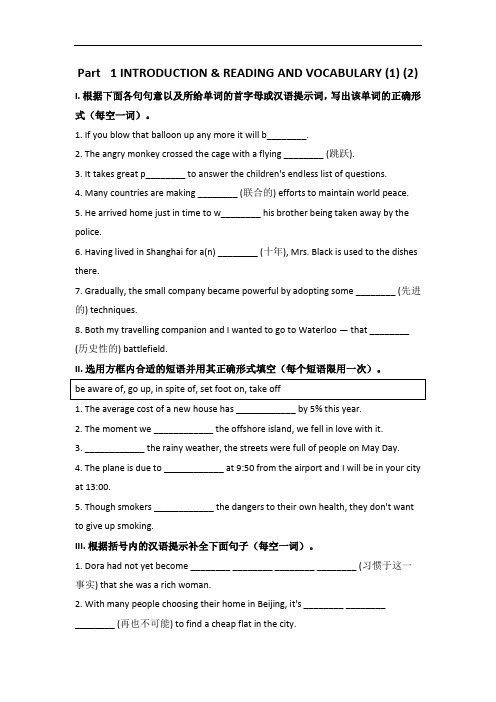
Part 1 INTRODUCTION & READING AND VOCABULARY (1) (2) I. 根据下面各句句意以及所给单词的首字母或汉语提示词,写出该单词的正确形式(每空一词)。
1. If you blow that balloon up any more it will b________.2. The angry monkey crossed the cage with a flying ________ (跳跃).3. It takes great p________ to answer the children's endless list of questions.4. Many countries are making ________ (联合的) efforts to maintain world peace.5. He arrived home just in time to w________ his brother being taken away by the police.6. Having lived in Shanghai for a(n) ________ (十年), Mrs. Black is used to the dishes there.7. Gradually, the small company became powerful by adopting some ________ (先进的) techniques.8. Both my travelling companion and I wanted to go to Waterloo — that ________ (历史性的) battlefield.II. 选用方框内合适的短语并用其正确形式填空(每个短语限用一次)。
1. The average cost of a new house has ____________ by 5% this year.2. The moment we ____________ the offshore island, we fell in love with it.3. ____________ the rainy weather, the streets were full of people on May Day.4. The plane is due to ____________ at 9:50 from the airport and I will be in your city at 13:00.5. Though smokers ____________ the dangers to their own health, they don't want to give up smoking.III. 根据括号内的汉语提示补全下面句子(每空一词)。
英语周报2016-2017学年高二外研版选修七:Module 6 试题 单元测试题 1 含答案 精品
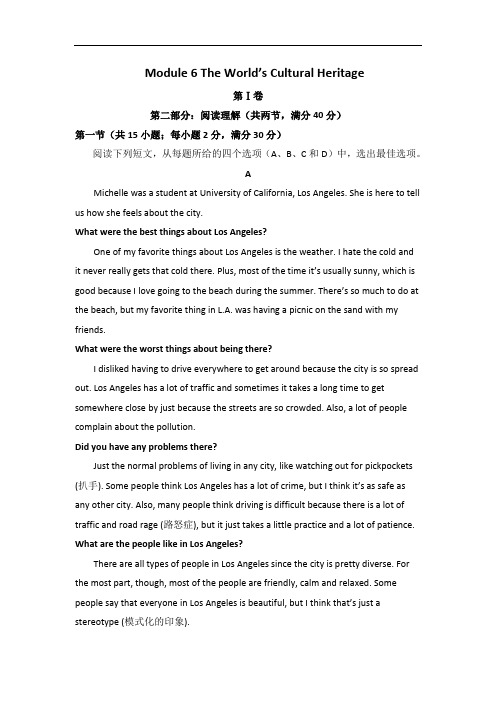
Module 6 The World’s Cultural Heritage第Ⅰ卷第二部分:阅读理解(共两节,满分40分)第一节(共15小题;每小题2分,满分30分)阅读下列短文,从每题所给的四个选项(A、B、C和D)中,选出最佳选项。
AMichelle was a student at University of California, Los Angeles. She is here to tell us how she feels about the city.What were the best things about Los Angeles?One of my favorite things about Los Angeles is the weather. I hate the cold and it never really gets that cold there. Plus, most of the time it’s usually sunny, which is good because I love going to the beach during the summer. There’s so much to do at the beach, but my favorite thing in L.A. was having a picnic on the sand with my friends.What were the worst things about being there?I disliked having to drive everywhere to get around because the city is so spread out. Los Angeles has a lot of traffic and sometimes it takes a long time to get somewhere close by just because the streets are so crowded. Also, a lot of people complain about the pollution.Did you have any problems there?Just the normal problems of living in any city, like watching out for pickpockets (扒手). Some people think Los Angeles has a lot of crime, but I think it’s as safe as any other city. Also, many people think driving is difficult because there is a lot of traffic and road rage (路怒症), but it just takes a little practice and a lot of patience. What are the people like in Los Angeles?There are all types of people in Los Angeles since the city is pretty diverse. For the most part, though, most of the people are friendly, calm and relaxed. Some people say that everyone in Los Angeles is beautiful, but I think that’s just a stereotype (模式化的印象).Would you go back to Los Angeles?Certainly. Los Angeles is one of my favorite cities in the world. I love the fact that it has all the nightlife and shopping of a big city, but also has access to beaches, parks, mountains and other places you can’t usually find in large cities. Between the weather and the beaches and all the fun things to do, it’s a great place to be.21. We can learn from the text that Michelle _____.A. hates the heavy traffic in Los AngelesB. dislikes the cold weather in Los AngelesC. thinks Los Angeles is small and crowdedD. enjoys driving everywhere in Los Angeles22. What’s Michelle’s impression o f the people in Los Angeles?A. They get angry easily.B. All sorts of people live there.C. They are patient and amusing.D. Everyone is kind and beautiful.23. How does Michelle find Los Angeles?A. Safe but noisy.B. Relaxing but busy.C. Polluted and dangerous.D. Diverse and interesting.24. We learn from the text that _____.A. Michelle was born in Los AngelesB. Michelle loved the life in Los AngelesC. Los Angeles has many traffic accidentsD. Michelle has no plan to return to Los AngelesBEvergreen Teen Book Club OfferThe Evergreen Teen Book Club invites you to join us and take full advantage of our limited-time introductory offer.If you join our club, you will receive a certificate for 3 free books. These are yours to keep, even if you decide to cancel your membership. However, if you decide to purchase just one book at the regular club price, you will receive a certificate for an additional 3 free selections after your first order is placed.As our member, you can benefit from all of our super sales and our Bonus Program. You accumulate 2 bonus points with each cash purchase of one book. Every 6 bonus points will earn you a certificate for one free book!To join our club, fill in the brief application listing your name, address, and phone number on the postage-paid card at the bottom of this page. Then drop the card in the mail and our present catalog will be immediately mailed out to you for your 3 free selections!This catalog offers a wide selection of over 500 books in every issue, including mysteries, adventures, biographies, cookbooks, sports, and many more. Our catalog also contains interviews with your favorite authors, reviews of newly published novels, and a teen top-ten list for both fiction and nonfiction.Once you are a member, you will receive our catalog monthly, but you don’t need to purchase any selections. We send you only exactly what you order.If you join before June 30th, we will also provide complimentary shipping (免费送货), even if you choose to order nothing except your 3 free books.You can build a great book collection!Begin now by taking advantage of this great offer.25. If you join the Evergreen Teen Book Club, you can _____.A. buy books at cost priceB. receive a gift after each orderC. expect 3 free books each monthD. get one free book for a cash purchase of 3 books26. If Lily wants to get free delivery, she should _____.A. join the club before June 30thB. accumulate 6 bonus pointsC. order at least 3 booksD. purchase the catalog27. The purpose of the text is to get more people to _____.A. collect books for the clubB. learn from famous writersC. read different kinds of booksD. join the club and order booksCDarek Fidyka, a 38-year-old Bulgarian, had been paralysed (瘫痪的) from the chest down for four years after a knife attack. Scientists from Britain and Poland took cells from his nose, transplanted (移植) them into his back and re-grew his spinal cord (脊髓). Now he can walk and even drive a car. The doctors were delighted but said it was the first step in a long journey.The breakthrough came after 40 years of research by Professor Geoff Raisman, who found that cells had the possibility to repair damage to nasal (鼻腔的) nerves, the only part of the nervous system that constantly (不断地) re-grows. “The idea was to take something from an area where the nervous system can repair itself, and does so throughout life, and put it into an area that doesn’t repair itself,” Professor Raisman said.Polish doctors injected the nasal cells into Mr Fidyka’s spinal cord above and below the injury and used some nerves from his ankle to form a bridge across the damaged tissue. The nasal cells appear to have caused the spinal nerves to repair themselves.Professor Raisman achieved this with rats in the late 1990s, but this is his greatest success. “I think the moment of discovery for me was Christmas in 1997 when I first saw a rat that couldn’t control its hand put its hand out to me. That was an exciting moment, because I realised then that my belief that the nervous system could be repaired was true.”Doctors chose the easiest case for their first attempt — it might not work for others. But there is a real sense of hope that an idea once thought impossible has been realised.David Nicholls, who helped provide money for the breakthrough, said information about the breakthrough would be made available to researchers across the globe.“What you’ve got to understand is that for t hree million paralysed people in the world today, the world looks a totally brighter place than it did yesterday,” he said.28. Why did Professor Geoff Raisman choose cells from the nose?A. The nervous system in the nose can repair itself.B. Cells in the nose can be easily transplanted.C. Cells in the nose re-produce rapidly.D. He just wanted to give it a try.29. Why did the operation work for Darek Fidyka?A. The nasal cells re-produced and spread quickly.B. The nerves from his ankle helped cure the injury.C. The nervous system in the spinal cord can repair itself.D. The nasal cells helped the spinal nerves to repair themselves.30. What made Professor Geoff Raisman believe the nervous system can be repaired?A. His study on animals.B. His operation on a paralysed patient.C. His sudden thoughts about Christmas.D. His unusual experience with a sick rat.31. David Nicholls’ words suggest that _____.A. the world is becoming better and brighterB. paralysed people have the hope of recoveryC. the report of the breakthrough will be published soonD. researchers across the globe will carry out the operationDThe Regional Director of the National Heritage Conservation Commission (国家遗产保护委员会) Kagosi Mwamulowe said the Barotse Plains is unique (独特的) and it deserves to be on the list of the World Heritage Sites.Mr. Mwamulowe said the Barotse Plains deserves to be included on the World Heritage List because it has a rich cultural heritage which includes the burial sites of former (以前的) kings.The Director said he hoped that the landscape would be declared as a heritage site next year in June. He also said it was important to protect Zambia’s unique culture for education and entertainment.Chief Natural Heritage Officer Muyumbwa Ndiyoi said there will be a lot of benefits when the Barotse Landscape is declared a World Heritage Site because it will attract many tourists and business investments will increase.Mr. Ndiyoi said the site will also benefit young people as knowledge will be passed down from generation to generation.He was reacting to a question from Nalolo District Labour Officer Jason Ngoma who wanted to know how the people of Western Province will benefit once the Barotse Landscape is declared a World Heritage Site.And University of Zambia Lecturer Charles Namate said there is a need for the site to be included on the World Heritage List because 50 years after its independence Zambia only has one heritage site, which is the Victoria Falls.Lecturer Namate said the Barotse Landscape was facing a lot of environmental degradation (恶化), and that’s why there is a need to recognize the value of its landscape and the memories of dead kings.The National Heritage Conservation Commission together with the Ministry of Chiefs and Traditional Affairs are in Western Province to hold meetings with Heads of Government Departments. The Commission also held closed-door meetings with the Litunga Lubosi Imwiko II of the Barotse Royal Establishment.32. What do we know about the Barotse Plains?A. It has royal tombs.B. It is being well protected.C. It is not far from the Victoria Falls.D. It’ll be listed as a World Heritage Site soon.33. Mr. Ndiyoi believes that if the Barotse Plains is declared a World Heritage Site,_____.A. it won’t benefit the people of Western ProvinceB. it will attract many foreign students and researchersC. it will contribute to the local economic developmentD. more people will start to learn about Zambia’s culture34. In the text, Lecturer Namate expressed his concern about _____.A. the future of the Barotse PlainsB. the development of Western ProvinceC. the development of tourism in ZambiaD. the environmental problems of the Barotse Plains35. What can we infer from the text?A. Zambia only has two World Heritage Sites.B. The Barotse Landscape has been partly destroyed.C. The Barotse Landscape issue is still being discussed.D. Young people in Zambia don’t know about Barotse culture.第二节(共5小题;每小题2分,满分10分)根据短文内容,从短文后的选项中选出能填入空白处的最佳选项。
- 1、下载文档前请自行甄别文档内容的完整性,平台不提供额外的编辑、内容补充、找答案等附加服务。
- 2、"仅部分预览"的文档,不可在线预览部分如存在完整性等问题,可反馈申请退款(可完整预览的文档不适用该条件!)。
- 3、如文档侵犯您的权益,请联系客服反馈,我们会尽快为您处理(人工客服工作时间:9:00-18:30)。
高二外研英语周报2016/2017学年第六期Book 5 Module 3 参考答案及部分解析参考答案1-5 BACBC 6-10BABCA11-15 BCACA 16-20BABCC21-25 DABBA 26-30DABAD31-35 CDCAC 36-40 AEBDG41-45 BDBCC 46-50 DBCAB51-55 DDACD 56-60 BBDCD61. successful 62.deeply63. to work 64. of65. was set 66. spent67. a 68. who69. appeared 70.working短文改错:71. ... my most favorite way ... 去掉most72. ... and I camped ... camped→camp73. ... which we sleep ... which →where74. ... cook in a fire ... in →over / on75. ... tastes wonderfully. wonderfully →wonderful76. ... smelling fresh air. smelling →smell77. ... in the tree ... tree →trees78. ... feel such peaceful. such →so79. ... cost many to ... many →much80. ... it's best way ... best前加theOne possible version:Dear John,I'm glad to receive your letter and I'dlike to tell you something about the English Movie Week held in our school lastweek.The activity aimed to make our school lifemore colourful and to develop our interest in English learning. Ten movies thathad won Oscars were shown from Monday to Friday in the school hall. By watchingthe movies, I learned more about Western culture. What's more, I took advantageof the opportunity and made many new friends. We all had a pleasant time duringthe whole week.Best wishes!Yours,LiHua部分解析阅读理解:第一节:A篇(文娱)本文是应用文。
文章是对著名的卡通配音演员Tara Strong的采访。
21. D。
推理判断题。
由文中的I've always been good atvoices and accents —it comes naturally可知,Tara Strong具有语言天赋。
22. A。
词义猜测题。
由Tara对Bubbles这个角色的高度评价She's fun, always looks onthe bright side, and is not afraid to be tough if she needs to be可知,她认可这个角色并对此感同身受,即“喜欢”。
23. B。
推理判断题。
由Tara描述她作为配音演员的生活I work almost every day可知,她每天都很忙碌。
24. B。
细节理解题。
由文中的Take as many actingclasses as you can. The more acting classes you take, the better!可知,Tara建议那些想要成为配音演员的孩子们尽可能多地参加表演课。
B 篇(旅游)本文是记叙文。
作者为写一本关于克朗代克淘金热时期的书而重走当年淘金工穿越的奇尔库特小径。
25. A。
推理判断题。
由第一段的I was afraid of bears.That's what was keeping me from walking the trail alone以及第二段作者遇到一起同行的Ron和Carol后的如释重负可知,在Chilkoot Trailhead标牌前驻足15分钟的作者,因为害怕熊而紧张地不敢独自徒步旅行。
26. D。
推理判断题。
由第三段的I was writing a bookabout the Klondike Gold Rush, and I wanted to follow in the footsteps of theminers to know what it was really like可知,作者此行是为了寻找写作灵感。
27. A。
细节理解题。
由第四段的As I was looking aroundat the beautiful scenery in the forest, I tripped over a big tree root andinjured my ankle可知,作者徒步穿越奇尔库特小径时,不小心弄伤了自己。
28. B。
推理判断题。
作者此次徒步旅行的目的是重走当年克朗代克淘金热时人们走过的路线,对比他到达目的地后乘坐火车、睡在宾馆舒服的床上,当年那些穿越奇尔库特小径的淘金工所经历的艰辛让作者非常同情。
C篇(自然)本文是说明文。
文章报道了美国夏威夷基拉韦厄火山喷发的熔岩流对当地所造成的影响。
29. A。
细节理解题。
由第四段HAAS学院主任Steve Hirakami说的we have experienced a loss of asmany as 100 students可知,由于熔岩流,很多家庭搬走了,这导致了学院的学生人数减少。
30. D。
细节理解题。
由第二段的in the past severalmonths, lava flow from Kilauea ...和倒数第二段的It makes it difficult to forecast when the flow might reach acertain point可知,从基拉韦厄火山喷发的熔岩流已持续了很长一段时间。
31. C。
推理判断题。
由最后一段Hirakami说的Don't waste time worrying aboutwhat you don't have. Enjoy each moment, and be thankful for what you do have可知,他从火山喷发学到的人生哲理是——珍惜眼前所拥有的一切。
D篇(现代技术)本文是说明文。
一对美国夫妇研造出太阳能电池板路面,并发起名叫Solar Roadways的众筹项目用以全面改造马路系统。
32. D。
细节理解题。
由第二段的glass panel thatcontains solar cells, whichcan change sunlight into electricity和第三段的... doesn't produce harmfulpollution可知,Brusaw夫妇研造出的太阳能电池板路面能把太阳能转化成电能,对环境没有任何污染。
33. C。
推理判断题。
由最后三段内容,尤其是倒数第三段的Theernment sees some promise in the Solar Roadways project可知,经实验室验证,路面所用太阳能电池板虽然达到了路面承受的所有要求,但由于该计划需要高昂的费用以及其它可能面临的阻碍可知,现今美国政府只是对该计划感兴趣。
34. A。
篇章结构题。
Brusaw夫妇的众筹项目即Solar Roadways project,结合第二段的 ... to use their inventionto replace the pavement on U.S. roads和第三段的... replaced all of the nation's asphalt with these solar panels可知。
35. C。
标题归纳题。
本文旨在介绍Brusaw夫妇想要全面改造马路系统的项目——用太阳能电池板代替沥青来铺设公路,并用于发电、供电。
由最后一段作者的质疑Could Solar Roadways be the answer to ...可知,从路面获取能源的想法还有待商榷,故C项标题最符合本文主旨。
第二节:话题:自然本文是说明文。
植物是自然界中的“生产者”, 人类生存更离不开植物。
36. A。
由下文解释植物的光合作用以及与首句People areconsumers的对比可知,植物是自然界中的“生产者”。
37. E。
下文的Plants have special structurescalled chloroplasts thatanimals don't have是对E项“植物可以进行光合作用而人类不可以这样做”的解释。
38. B。
B项中的Chemical reactions指本段介绍的植物中的叶绿素在光的作用下吸收二氧化碳、释放氧气的这一化学反应过程。
39. D。
由下文的Plants rely on the carbondioxide that we breathe out, and we rely on the oxygen that they “breathe”out可知,人类与植物之间的关系是完美的搭档。
40. G。
G项是人类之所以建立各种自然资源保护项目的原因——人类生活质量和空气质量的保证依赖于绿色植物。
英语知识运用:第一节:话题:学校生活本文是议论文。
作者探讨了人们上大学的三个原因。
41. B。
由下文作者解释的原因可知,他“相信(believe)”人们上大学的原因主要有三个。
42. D。
43. B。
由下文的Good preparation for future careers和increases their knowledge of themselves可知,这三个最常见的原因是——为未来职业“做准备(prepare for)”、体验新的经历、“增加(increase)”自我认识以及对周围世界的了解。
